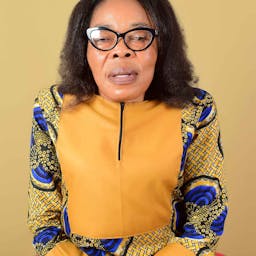Web 2.0: Women are overcoming barriers
Jan 21, 2015
Story
Born in a suburb area during a crisis, chances of survival were limited for children born during my time hence the prevalent disease ‘kwashiokor’ caused by malnutrition. Survival milestones were limited for me considering my poor family background. Moreover I was a girl-child and as such ‘delicacies’ like egg and meat, if available, should be given to male children. Women at that level were helpless and ignorant. Access to empowerment via information sharing was not in view.
I live with a vision driven by everyday challenges. Growing up with an instinct to make a change, I desire that women be empowered to take full charge of their life. I cry out and in my culture, crying out means seeking attention, seeking for solutions, exploring avenues for better living. Solutions come as I meet and connect with women who share my interests and aspirations. Sharing information through social networks, I gain inspirations, motivations, supports. Thanks to Facebook, Twitter and Pulsewire. Pulsewire weaves me into a net of sisterhood where I live in a community of global women with a common focus to effect social change. I shouldn’t have had it better or faster through traditional letter writing and postal services. The chain-reaction to first post on my blog was awesome. I felt the power in women's solidarity. My tiny voice shouldn’t have attracted such attention from traditional media. I feel good and excited raising awareness, creating connections and building movements within minutes.
Web 2.0 has offered solutions to ignorance, giving women opportunities to learning. Knowledge is power, a knowledgeable woman is an empowered woman. Women have demonstrated abilities to effect social change, thanks to Web 2.0. With the platform, women’s voices are heard even from the most remote parts. Documentaries by women on YouTube are testimonies which expose gender stereotypes, inequalities, violence, marginalization, discrimination and abuse of rights. Women’s voices thus attract global interests and the focus impacts on policies of nations. Global women’s movements are overcoming frustrations limiting global information sharing. With less stress, movements now communicate across borders, hold interactive online conferences, share best practices and get motivations for the fight for a better world.
I study and learn through social networks that the world over, there is a war on women. Differences are only in names, dimensions and geographical locations. The subjection of women to washing toes of husbands and drinking the dirty water during Tij festival in Nepal is similar to experience of widows in Nigeria, Breast-ironing in Cameroun has same consequences on girls as FGM in Sudan. Women are making changes.Barriers to information sharing and dissemination are broken by Web 2.0 and access to first-hand information using Web 2.0 makes me understand that women in my community share same issues with other women. This gives me sense of belonging and confidence to discuss global issues using my own lens. Yes, my community is still hopeful that one day we will overcome difficulties and have easier access to the facilities, tools and platform provided by Web 2.0. We build synergies.
Celine




